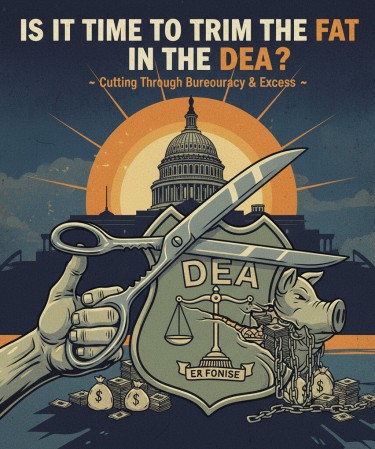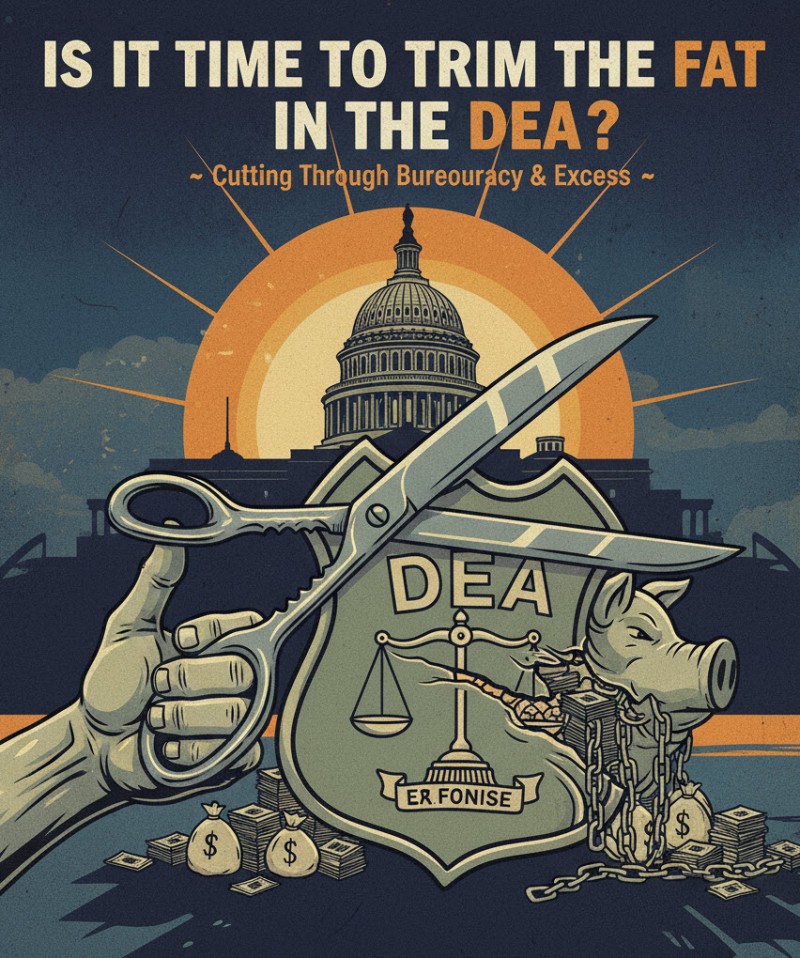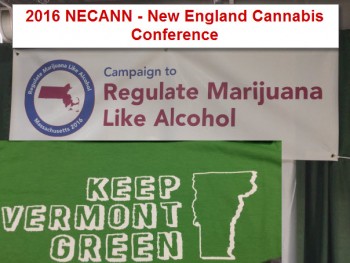
Is it time to trim the fat in the DEA?
After over fifty years of existence, the Drug Enforcement Administration has compiled a track record that would make any other federal agency blush with shame. They've lost the War on Drugs spectacularly, overseen the rise of the deadliest overdose crisis in American history, and spent hundreds of billions of taxpayer dollars with virtually nothing to show for it except overcrowded prisons and destroyed communities.
But perhaps their most egregious failure isn't what they've done – it's what they've prevented. For decades, the DEA has systematically blocked legitimate medical research that could save lives, treating scientists like drug dealers and patients like criminals. The recent controversy over MMJ BioPharma's seven-year licensing nightmare is just the latest example of an agency that seems more interested in protecting pharmaceutical profits than public health.
Now, as the Environmental Protection Agency makes headlines for firing employees who criticized leadership, a critical question emerges: could the DEA be next? With new Administrator Terry Cole promising accountability and longtime obstructionists like Matthew Strait and Thomas Prevoznik finally retired, there's a glimmer of hope that this bloated bureaucracy might finally face some consequences for its decades of institutional failure.
The EPA fired eight employees for dissent. The DEA should fire entire divisions for constitutional violations, scientific obstruction, and outright incompetence. Where the EPA employees signed letters criticizing policy, DEA officials have spent years actively sabotaging FDA-approved research into treatments for Huntington's disease and Multiple Sclerosis. If writing a dissent letter gets you fired, what should happen to officials who block potentially life-saving medical research?
This isn't just about cannabis – it's about an agency that has consistently prioritized ideology over evidence, politics over patients, and pharmaceutical interests over public welfare. The DEA's Diversion Control Division has become a black hole where scientific progress goes to die, and it's time we asked the hard question: in an era of government efficiency and accountability, why are we still funding an agency whose primary achievement is making drugs more dangerous and medical research impossible?
Seven Years of Sabotage: How the DEA Kills Medical Research
The MMJ BioPharma case reads like a masterclass in bureaucratic sabotage. For seven years, this company has been trying to get a license to grow cannabis for FDA-approved clinical trials targeting Huntington's disease and Multiple Sclerosis – two devastating conditions that desperately need new treatments. Seven years. Let that sink in.
This isn't some fly-by-night operation trying to get rich quick. We're talking about legitimate medical research, approved by the FDA, targeting diseases that cause immense suffering. Yet the DEA's Diversion Control Division has thrown up every conceivable roadblock, moving goalposts, creating new requirements out of thin air, and demanding security measures that would make Fort Knox jealous.
The pattern is always the same: promising initial discussions followed by endless delays, arbitrary rule changes, and demands for "supply agreements" that mysteriously shift every time the company tries to comply. MMJ has spent hundreds of thousands of dollars just trying to meet ever-changing requirements, while patients with progressive neurological diseases lose precious time.
Matthew Strait and Thomas Prevoznik, the longtime DEA officials who orchestrated much of this obstruction, have conveniently retired. But their legacy lives on in the form of DEA attorney Aarathi Haig, who continues prosecuting the case despite questions about her bar compliance in New Jersey. When government lawyers can't even maintain their professional licensing, you know the system is broken.
What makes this particularly infuriating is the constitutional dimension. Recent Supreme Court rulings in Axon v. FTC and SEC v. Jarkesy have already undermined the DEA's use of in-house Administrative Law Judges. The agency is using a judicial process that the Supreme Court has essentially declared illegitimate to block research that could save lives.
This isn't policy disagreement – it's constitutional violation wrapped in bureaucratic procedure. The DEA has weaponized administrative law to protect their prohibition empire, creating a system where legitimate researchers are treated like criminals while actual criminals flood the country with fentanyl.
The human cost is staggering. Huntington's disease is a death sentence that typically kills within 15-20 years of diagnosis. Multiple Sclerosis can leave patients wheelchair-bound and cognitively impaired. Every month of DEA obstruction represents lost opportunities for breakthrough treatments.
But here's what really exposes the DEA's priorities: while they've spent seven years blocking cannabis research for neurological diseases, they've done virtually nothing to stop the fentanyl crisis that kills 80,000 Americans annually. They can find time to harass legitimate medical researchers but somehow can't secure the border or stop Chinese chemical companies from shipping precursor chemicals to Mexican cartels.
The agency that claims to protect Americans from dangerous drugs has made drugs infinitely more dangerous by driving them into unregulated black markets. The agency that claims to support medical research has systematically blocked the most promising medical research in decades. At what point do we acknowledge that the DEA isn't just ineffective – it's actively counterproductive?
Big Pharma's Enforcers: The DEA's Real Mission
Let's cut through the bureaucratic doublespeak and acknowledge what the DEA actually does: they serve as Big Pharma's enforcement arm, ensuring that pharmaceutical companies maintain their monopoly on drug manufacturing, distribution, and research. This isn't conspiracy theory – it's the logical outcome of a system designed to criminalize competition.
The Controlled Substances Act, which created the DEA, doesn't just regulate drugs – it hands pharmaceutical companies exclusive control over an entire market. Only FDA-approved medications can be legally produced and sold, and the FDA approval process costs hundreds of millions of dollars and takes decades to complete. This creates an insurmountable barrier for natural substances like cannabis that can't be patented.
Think about the economics: if cannabis can treat the same conditions as expensive pharmaceutical drugs, but can be grown in someone's backyard, what happens to those massive profit margins? The answer is simple – pharmaceutical companies lose billions, and they're not about to let that happen without a fight.
This explains why the DEA goes to such extraordinary lengths to block cannabis research. Every successful clinical trial that demonstrates cannabis efficacy is a direct threat to pharmaceutical revenue. If researchers prove that cannabis can effectively treat Huntington's disease, Multiple Sclerosis, epilepsy, or chronic pain, patients might choose a plant over pills.
The revolving door between the DEA and pharmaceutical industry tells the real story. Former DEA officials routinely land lucrative consulting gigs with pharmaceutical companies, while former pharma executives find themselves in key regulatory positions. This isn't public service – it's a jobs program for prohibition profiteers.
Consider the timing of DEA obstructionism. They don't block all medical research – just research into substances that compete with patented pharmaceuticals. When Purdue Pharma wanted to flood the market with OxyContin, the DEA was nowhere to be found. When researchers want to study cannabis for the same conditions that opioids supposedly treat, suddenly the DEA becomes obsessed with "public safety."
The agency's selective enforcement reveals their true priorities. They'll raid state-legal cannabis dispensaries while ignoring pharmaceutical companies that kill hundreds of thousands with their products. They'll spend years blocking research into a plant that has never caused a fatal overdose while facilitating the distribution of synthetic opioids that create addicts by design.
This isn't incompetence – it's corruption institutionalized as drug policy. The DEA doesn't exist to protect Americans from dangerous drugs; they exist to protect pharmaceutical companies from safe competition. Every legitimate medical researcher who gets blocked, every patient who dies waiting for treatment, every family destroyed by the opioid crisis – these are the costs of maintaining Big Pharma's monopoly.
The pharmaceutical industry spends more on lobbying than defense contractors, and they get their money's worth. They've purchased an entire federal agency dedicated to eliminating their competition and criminalizing alternatives to their products. The DEA isn't a law enforcement agency – they're corporate enforcers with badges and guns.
Until we acknowledge this reality, we'll keep pretending that reform is possible when the entire system is designed to serve corporate interests over public welfare.
The Sticky Bottomline: Trimming Fat or Cutting Cancer?
The question isn't whether we should trim the fat at the DEA – it's whether we can save anything worth preserving. After decades of spectacular failure, constitutional violations, and serving as Big Pharma's enforcement arm, the agency has become a malignant tumor on the body politic.
New Administrator Terry Cole faces a choice: continue the DEA's legacy of obstruction and prohibition, or fundamentally restructure an agency that has lost all credibility. The EPA fired eight employees for writing dissent letters. The DEA should fire entire divisions for blocking life-saving medical research and facilitating the deadliest drug crisis in American history.
But let's be realistic – meaningful reform seems unlikely given the agency's deep ties to pharmaceutical interests. The same industry that profits from prohibition also profits from the DEA's continued existence. Any real reform would threaten billions in pharmaceutical revenue, and that's not a fight the DEA is prepared to have with their masters.
Perhaps the most honest approach would be complete dissolution. Transfer actual law enforcement functions to the FBI, regulatory functions to the FDA, and let the states handle drug policy as they see fit. The DEA's prohibition empire has caused immeasurable harm while solving nothing.
The MMJ BioPharma case represents everything wrong with the DEA: constitutional violations, scientific obstruction, and regulatory capture in service of corporate profits. If Administrator Cole wants to restore credibility, he needs to do more than trim fat – he needs to acknowledge that the entire agency has become a cancer on American healthcare and scientific progress.
Some institutions can be reformed. Others need to be replaced entirely.






